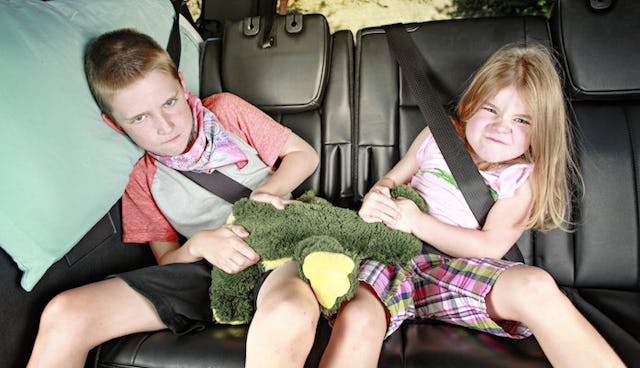When Your Kid Sucks At Sharing, Sometimes A Hands-Off Approach Works Best

On a recent trip to our local market, my kindergartner spied a bag of chocolate toffee. When she asked if we could buy it as a treat, I said yes.
“Do I have to share?” she asked anxiously.
I sighed. My 5-year-old daughter is the absolute worst at sharing. She was the toddler in the sandbox who pulled her pail, two shovels, plastic rake, and watering can closer whenever another kid came within 3 feet of her. When she has a friend over, she’ll put away her favorite dress-up costume rather than have to take turns wearing it. In the mornings over breakfast, she frets about having to share the pink striped hula-hoop during recess.
It’s not that she doesn’t get the concept. Preschool, playdates, and now kindergarten all highlight the benefits of taking turns and that “sharing is caring,” but it’s still a huge challenge for her. Parting with any possession, whether it’s a returnable item, like a favorite pencil or a forever offer, like a lick of ice cream, does not come easily for her. I point out the benefits of sharing, kindness being the number one reason it’s a good choice, but usually end up coaxing, cajoling, and even bribing her to share. I’m often doing this in the company of other adults, and when my daughter refuses to share, I can’t help but feel judged.
It’s that feeling of failure that makes me want to pull parent rank and insist that she share; otherwise there will be a consequence. When my kid shares, it makes me feel good, like I’ve got all my parenting bases covered. Forcing her to do it, though, would really only be for my public benefit, not hers. Research shows that we humans consider our possessions an extension of ourselves. Is it any wonder, then, that kids don’t want to give up ownership over stuff they feel defines them? As adults, we might think it’s no big deal to let little Mia have a turn with Lila’s sparkly purple pony, but to Lila, it feels like holding her breath for 20 minutes.
Teaching — and often insisting — our children share is what our culture expects, even though I’m not convinced it’s always necessary. Yes, skills like negotiating, cultivating patience, and dealing with disappointment when you don’t get what you want are all valuable, but who wants to have to share everything all the time, from toys to snacks to sunscreen?
I mean, can you imagine sitting at a cafe serenely scrolling through Instagram when a random person comes up to you and says, “I want your phone,” and proceeds to wrangle said phone out of your hands? That’s when you make the crazy eyes, snicker in disbelief, and say something along the lines of “no fucking way.” You might even call the cops. As grown-ups, we wouldn’t dream of handing over our prized possessions just because someone demanded it. Yet, we expect our young kids to do just this and are dismayed when they won’t.
It was this kind of thinking that had me wondering if there is something wrong with my kid. Why doesn’t she want to share? Is she missing a facet of the empathy chip? I’ve seen her treat animals with the utmost gentleness and rush to help a friend who’s scraped her knee, but sharing is not her gig. Maybe sharing is hard for her because she’s the youngest of three and not much in our house is truly hers: a lot of her clothes are hand-me-downs, as are the mounds of stuffed animals, tangled Barbies, battered wooden puzzles, and dog-eared books. Could it be about a loss of control? I know I feel anxious when someone makes an unwanted or unplanned request of me that I have to respond to right away. Maybe she takes after me.
Whatever the reasons, my kid sucks at sharing. While it might never come naturally for her, I don’t believe the simple act of sharing is the be-all, end-all. The ultimate goal isn’t that she learns to deal with the discomfort of giving up a special object for a time or gives in to cultural expectations.
What’s more important to me is that she learns kindness, empathy, and how her actions affect others. I want her to want to share, not do it because I, or another adult, said so or because some other kid is whining for a turn or crying because it’s not fair. I want her to have that feeling in her heart that you get when you’re genuinely generous, when you realize that giving something you have to someone else can actually fill you both up.
I look down at my girl’s sweet, concerned face, imagining the struggle going on inside her as she contemplates having to give up some portion of the toffee to her two older sisters. I’m not going to make her share, but I am going to ease her toward making a kind decision on her own.
“No, you don’t have to share,” I say. “But I know your sisters would be so happy if you did.”